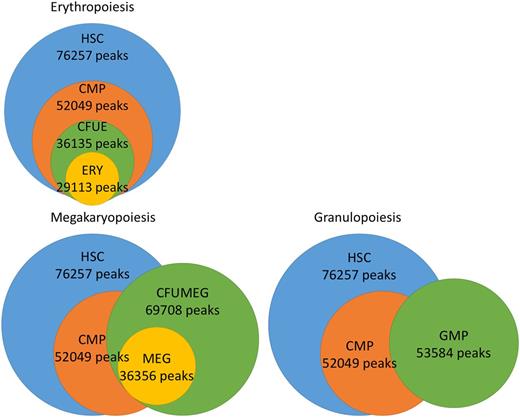Abstract
Previous research has shown that progressive DNA demethylation is a feature of erythroid differentiation (Hogart et al. 2012, Genome Res., 22:1407-18; Shearstone et al. 2011, Science, 334:799-802), but the epigenetic changes that occur during granulopoiesis and megakaryopoiesis have not been well characterized. To establish a comprehensive map of changes in DNA methylation, we have extended our analysis of DNA methylation to include megakaryocytes (MEG) and their progenitors (CFU-MEG), as well as granulocyte macrophage progenitors (GMP), common myeloid progenitors (CMP) and hematopoietic stem cells (HSC; Lin- Sca-1+, c-kit+).
Erythroblasts (ERY), their progenitors (CFU-E), MEG, CFU-MEG, GMP, CMP and HSC were isolated by FACS from adult C57BL/6J mouse bone marrow. We performed whole genome DNA methylation profiling using Methyl Binding Domain 2 (MBD2) pulldown with subsequent high-throughput sequencing to detect regions containing 5 or more methylated CpGs within a 200bp window. Using the reduced representation bilsulfite sequencing data of Shearstone et al. as a benchmark, we identified CCAT (Xu et al. 2010, Bioinformatics, 26:1199-1204) as the best performing peak calling software to detect de novo methylation, and used CCAT to generate DNA methylation profiles for our isolated hematopoietic populations.
We confirmed that erythropoiesis undergoes global demethylation (Figure 1). Epigenetic memory is a feature of erythropopiesis, with the majority of methylation peaks detected in erythroblasts also found in their progenitors. For example, 34,427 of the 36,135 CFU-E peaks are also found in HSC. Using Ingenuity Pathway Analysis (IPA), we found that the CFU-E genes with de novo promoter methylation (380 genes) were associated with the "DNA methylation and transcriptional repression signaling pathway" (p=9.6E-5), supporting the model of suppression of DNA methylation and epigenetic memory as a feature of erythropoiesis.
In contrast, we found that compared to CFU-E, CFU-MEG undergo de novo methylation. Specifically, we detected 25,531 methylation peaks in CFU-MEG that are not present in HSC or CMP (Figure 1). Genes with de novo promoter methylation in CFU-MEG (1227 genes) were associated with silencing of extracellular signaling pathways, including disruption of MAPK and FAK signaling (p=1.4E-5). We have developed a systems biology data ranch named SBR-Blood (Lichtenberg et al. 2016, Nucleic Acid Res., 44:D925-31) that includes 228 publicly available epigenetic and RNA expression profiling datasets. Using SBR-Blood, we correlated the increased methylation in CFU-MEG with increased expression of the de novo methylation genes Dnmt3A/B genes (6 and 34-fold respectively), and decreased expression of the maintenance methylation gene Dnmt1 (1.5-fold).
Compared to HSC, GMP acquired 15,115 de novo methylation peaks and CMP gained 4020 de novo peaks (Figure 1). Promoter-specific de novo methylation in 784 GMP genes was associated with silencing of Endothelin-1 signaling (p=8.1E-5), an observation confirmed using RNASeq expression profiles in SBR-Blood (e.g. AC-complex 20-fold decrease).
In summary, we have shown that in contrast to erythropoiesis, megakaryopoiesis and granulopoiesis are associated with specific de novo methylation that defines their respective lineages.
Venn diagrams, annotated with total DNA methylation peak counts for a cell type, depicting the intersections between the peaks of DNA methylation profiles in megakaryopoiesis and granulopoiesis, compared to erythropoiesis.
Venn diagrams, annotated with total DNA methylation peak counts for a cell type, depicting the intersections between the peaks of DNA methylation profiles in megakaryopoiesis and granulopoiesis, compared to erythropoiesis.
No relevant conflicts of interest to declare.
Author notes
Asterisk with author names denotes non-ASH members.


This feature is available to Subscribers Only
Sign In or Create an Account Close Modal